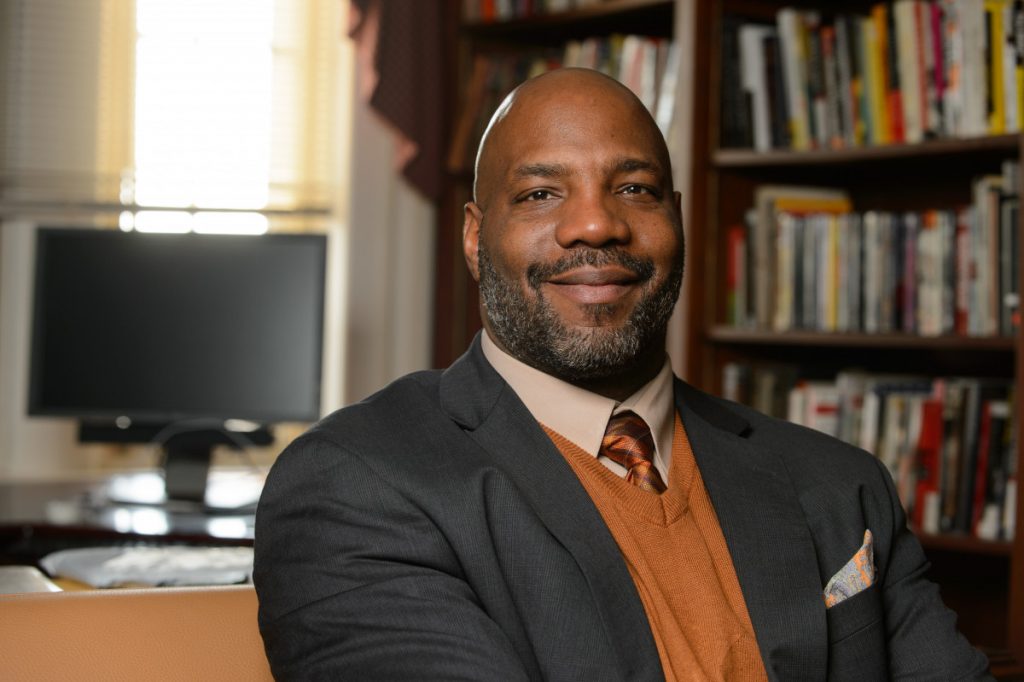In 2018, New Yorker staff writer Jelani Cobb first came to Chautauqua Institution to speak about “we the people” during a week themed “American Identity.” He concluded his lecture on a hopeful note that democracy would triumph in the future.
“In short, it is possible for democracy to exist in this land — it does not quite at this moment,” he told Chautauquans in 2018. “This struggle we have inherited from generations past, but I have no doubt that as people of conscience and diligence, it will. It will one day.”
Four years later, the continued prosperity of democracy hangs in the air. The 2020 election presented the highest voter turnout percentage since 1900. Yet, the Russia-Ukraine War and disputed presidency of Venezuela’s Nicolás Maduro demonstrate only two examples of autocracy’s global threat to democracy.
Cobb returns at 10:45 a.m. Wednesday, July 27, to the Amphitheater stage for the Week Five theme, “The Vote and Democracy.”

His 2018 lecture partially inspired the Institution’s invitation to speak again, according to Vice President and Emily and Richard Smucker Chair for Education Matt Ewalt.
“Jelani’s lecture in 2018, during the week on ‘American Identity,’ was one of the most powerful lectures in recent years, in which he challenged us to think about what ‘we the people’ has meant throughout history,” Ewalt said.
Cobb’s extensive journalistic work with voting rights issues also influenced the decision to have him speak, Ewalt said.
The imminent dean of the Columbia Journalism School, Cobb has contributed to several prominent publications, including The New Yorker and The Washington Post, and has written or edited several books.
His most recent book is the 2021 The Matter of Black Lives: Writing from The New Yorker, an anthology of Black history in the United States that he co-edited.
Another of Cobb’s more recent projects is the PBS “Frontline” episode “Whose Vote Counts,” for which he was an investigative reporter and correspondent. The episode, which examines claims of voter fraud and draws a throughline between racism, COVID-19 and the suppression of certain voters, won a Peabody Award, and closely relates to the Week Five theme.
“I think that his work that has specifically examined the fight for voting rights today, his focus on voter suppression — what he’s described as a fire that has spread across the country — and the urgent need for us to look at this issue … and his work in the ‘Frontline’ documentary, ‘Whose Vote Counts’ (signify) that he is indeed the voice we need to hear from,” Ewalt said.
Cobb’s lecture will likely be guided by an emphasis on voting rights and voter suppression, Ewalt said.
He hopes Cobb’s lecture will transcend political jargon that typically dominates conversations of voting rights, as well as inspire Chautauquans to consider their role as active citizens within voting reform.
“I think the larger issue of voting rights has been an extremely heated part of an extremely heated national dialogue, and one of great division,” Ewalt said. “But I think (the week provides) the opportunity to unpack: ‘What does it mean for us to be looking at voting rights and reform as it relates to the current state and future of our democracy? What does it mean to get beyond any kind of political rhetoric used to understand the stakes, and to understand what reform can actually look like?’ ”
With the relevance and enormity of issues with voting rights, Ewalt wants Chautauquans to walk away from Cobb’s lecture not particularly in agreement with each other, but with an expanded understanding of their shared responsibility to pursue a more equitable voting system.
“Part of the opportunity is to take that which at times can be extremely heated and hostile (and turn it) into a conversation in which we wrestle with these issues together — not necessarily to come to consensus, but to challenge our own assumptions, broaden our understanding of the issues, and truly consider what roles, what opportunities, what obligations we have in ensuring a stronger democracy,” Ewalt said.




